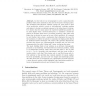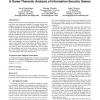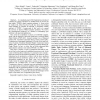224 search results - page 43 / 45 » On Nash-Equilibria of Approximation-Stable Games |
SIAMCO
2010
13 years 5 months ago
2010
We consider linear-quadratic-Gaussian (LQG) games with a major player and a large number of minor players. The major player has a significant influence on others. The minor playe...
CRYPTO
2000
Springer
13 years 11 months ago
2000
Springer
In this work we use cryptography to solve a game-theoretic problem which arises naturally in the area of two party strategic games. The standard game-theoretic solution concept for...
WWW
2008
ACM
14 years 8 months ago
2008
ACM
Despite general awareness of the importance of keeping one's system secure, and widespread availability of consumer security technologies, actual investment in security remai...
WINE
2009
Springer
14 years 2 months ago
2009
Springer
Recent results regarding games with congestion-averse utilities (or, congestion-averse games—CAGs) have shown they possess some very desirable properties. Specifically, they hav...
FOCS
2009
IEEE
14 years 2 months ago
2009
IEEE
— In a landmark paper [32], Papadimitriou introduced a number of syntactic subclasses of TFNP based on proof styles that (unlike TFNP) admit complete problems. A recent series of...




